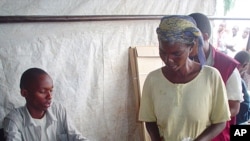This is Part Seven of a seven-part series on African constitutions
Continue to Parts: 1 / 2 / 3 / 4 / 5 / 6 / 7
Africa scholars agree that some constitutions on the continent are better than others, and some have good parts, but they say too much emphasis is placed on the constitutions themselves.
South Africa's post-apartheid constitution, which came into effect in 1997, is often presented as a model for a good constitution, seeking to establish democratic values, social justice and human rights.
Burundi
Africa scholars, like Timothy Longman, the director of the African Studies Center at Boston University, also point to other constitutional successes, such as in post-conflict Burundi.
That country’s 2005 constitution set out ethnic parameters for the composition of the parliament and military, in an effort to defuse long-standing tensions between Tutsis and Hutus.
Longman says it's been quite effective.
"There are political problems in Burundi to be sure, but interestingly they are much less focused on ethnicity than they were before, so certainly when it comes to the issue of making all the ethnic groups feel like they are represented in the constitution, it seems to have made a big difference," Longman said.
DRC, Nigeria
J. Peter Pham, the Africa director at the Washington-based Atlantic Council, says some countries like the Democratic Republic of Congo have good constitutions on paper, but when these are not respected, they have little effect.
"The Democratic Republic of Congo does not have a bad constitution per say; its real problem is elections that are free, transparent and fair, so it has never quite lived up to the letter of the law," Pham said.
Scholars say that often times, Africa's constitutions seem to be focused too much on centralized power and not enough on diversity. G. Pascal Zachary, a professor at Arizona State University who writes the Africa Works blog, would like to see changes in Nigeria's constitution, along those lines.
"I think that there is very much something missing in religious and regional grievances. The constitution might provide for a new kind of regional autonomy," Zachary said.
Broad opportunities
South African President Nelson Mandela, center, flanked by his two deputy presidents, Thabo Mbeki, left and F.W. de Klerk, right, clap after a new constitution was approved by the Constitutional Assembly in parliament in Cape Town, South Africa, May 8, 1996.(AP Photo)
A professor of political science at Yale University, South Africa native Ian Shapiro, says it is important for constitutions to facilitate broad economic and political opportunities.
"If you have a situation where the people controlling the government have access to all the economic wealth, have access to all the external contracts, and have access to all the political perks and so on, then those who are not in the government are much more likely to defect from the system to become either criminals or to try and have a coup or to try and overthrow the system in some way," Shapiro said.
But Shapiro says getting better constitutions should not be the main priority of civil society activists.
"Things like corruption or failing institutional capacities of the state or drought, these are the things that have to be dealt with if a country is going to become viable," Shapiro said. "Changing the constitution does not make much difference."
While bad constitutions can prevent progress, he also says better-looking constitutions, at least on paper, have not prevented coups or civil wars.
In the short to medium term, many scholars point to targeted legislation with proper enforcement on political, economic and social issues as a more effective way to build and strengthen democratic societies.




